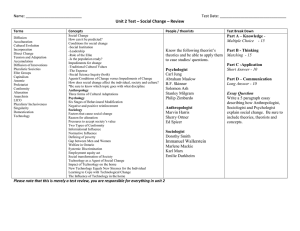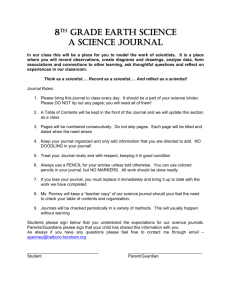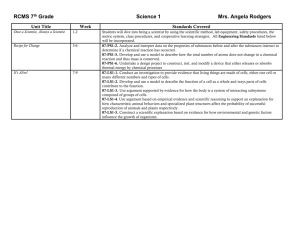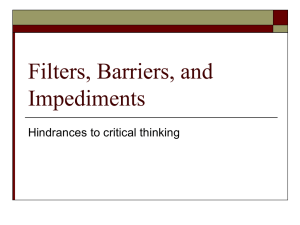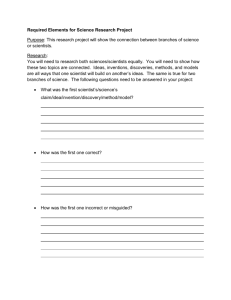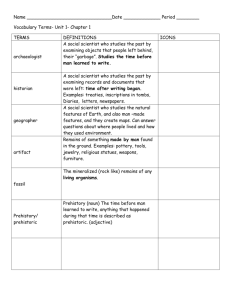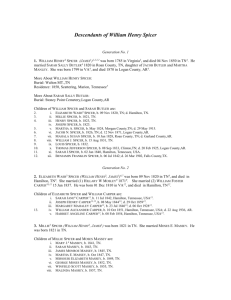Social Change Worksheets
advertisement
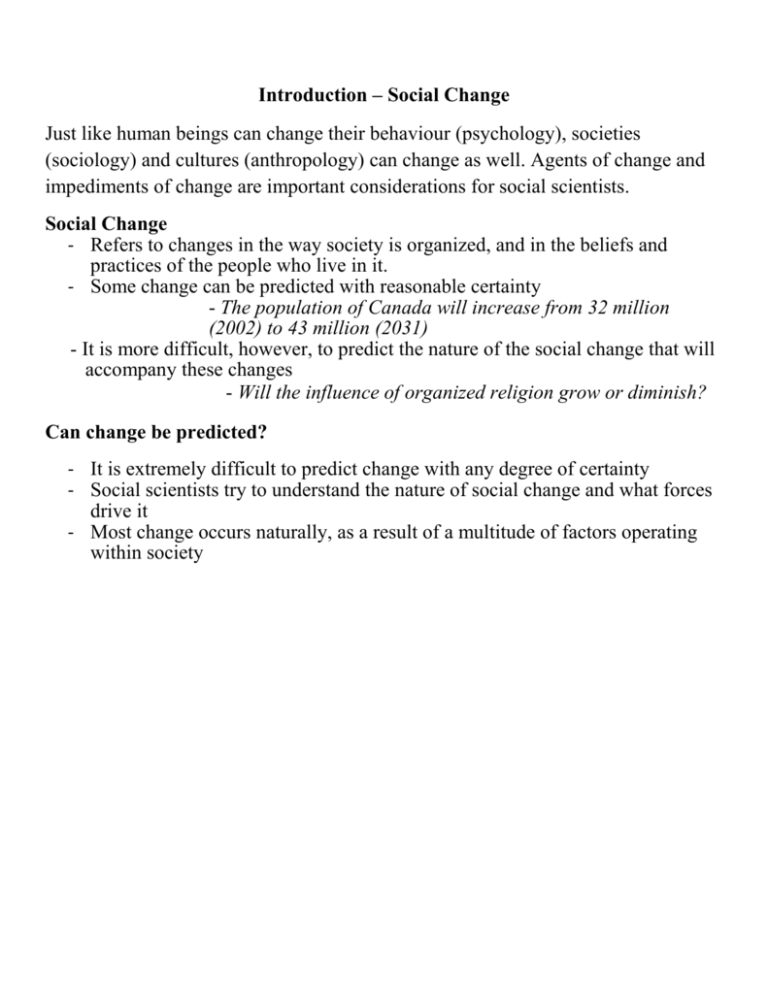
Introduction – Social Change Just like human beings can change their behaviour (psychology), societies (sociology) and cultures (anthropology) can change as well. Agents of change and impediments of change are important considerations for social scientists. Social Change - Refers to changes in the way society is organized, and in the beliefs and practices of the people who live in it. - Some change can be predicted with reasonable certainty - The population of Canada will increase from 32 million (2002) to 43 million (2031) - It is more difficult, however, to predict the nature of the social change that will accompany these changes - Will the influence of organized religion grow or diminish? Can change be predicted? - It is extremely difficult to predict change with any degree of certainty - Social scientists try to understand the nature of social change and what forces drive it - Most change occurs naturally, as a result of a multitude of factors operating within society Conditions for Social Change “Everyone over the age of 40 is an immigrant” - Margaret Mead Conditions for Social Change Social institutions - hold a fair degree of respect as long as they fulfill the needs of most people, and the institutions themselves recognize that they must change over time as conditions and prevailing popular opinions change. - Change can be positive or negative, depending on your perspective - cut backs in taxes Leadership - Social institutions hold a fair degree of respect as long as they fulfill the needs of most people, and the institutions themselves recognize that they must change over time as conditions and prevailing popular opinions change. - Change can be positive or negative, depending on your perspective - cut backs in taxes Role of the Elites - On many occasions in the life of a society, no single charismatic leader appears. This does not mean the process of change stops. - In many societies, there exists what is called one or more “modernizing elites” - Groups of people who create significant social change and influence the direction in which it goes - Sheiks in Saudi Arabia Is the Population ready? If a population is not ready for the kind of change a charismatic leader proposes, nothing will happen. For the relationship to work, the vision has to match the “mood” of the public Otherwise, no one will listen, and the potential leader will be quickly forgotten. What makes a public ready for change? When their attitudes and factors change Impediments (barriers) to Change Traditional Cultural Values Traditional world view - pushing an adherence to old practices Holding on to traditional values and doctrines Same Sex Marriage The Expense In Canada, a great deal of taxpayer’s money has been invested in programs to achieve particular social goals (ie. Health care) Such programs are costly, and the demand for new programs to target other social problems outstrips the ability or willingness of government to support them all Government can only support programs that taxpayers are able to finance. Ex. Health care in the US, Social Science Inquiry (Both Impediment or Support) Participatory research - to produce knowledge to help motivate social change and to empower an oppressed group The subject group itself participates in deciding what the goals and methods of the study should be, and how the finding should be used Activism research aims to highlight and change social inequality, but it does not require that the subject group participate. Social Change – Student’s Copy Directions: Identify agents of change and barriers of change for individuals, societies, and cultures by considering the following scenarios. Agent of Change: Reasons for change Impediments of Change: Obstacles that prevent change Psychology Why do people change their behaviour? Scenario 1: Student A tends to procrastinate. After years of this behaviour, Student A decides to stop procrastinating. A) What are the agents of change for Student A? B) Why do you think this change occurred? C) What were the impediments of change for Student A? Sociology Why do societies change? Scenario 2: Women in Canada did not have the right to vote in federal elections until 1918. A) What were the agents of change in Canada that led to women getting the right to vote? B) Why do you think this change occurred? C) What were the impediments of change for Canadian society? Anthropology Why do cultures change? Scenario 3: Canadian culture today is different from Canadian culture in the nineteenth century. A) What agents of change can you identify? B) Why do you think these changes occurred? C) What were the impediments for cultural change? Social Change Organizer – Part I Directions: Provide one major question that an anthropologist, psychologist, and sociologist might ask regarding these particular social changes. Also provide Agents of change and impediments regarding each case. Social Change Case Studies More teenagers have part-time jobs today than five years ago The majority of Canadians are living longer The number of Canadians in regular religious attendance is falling. A new group of young teenagers (10 to 12 years of age) has become increasingly important to the North American economy. They have been named “tweens.” Greater numbers of North American men are taking parental leave today than five years ago. The Canadian population is made up of more diverse cultural groups. Anthropology Question Sociology Question Psychology Question Agents of Impediments Change(Cause) (Barriers) Social Change Organizer – Part II 1) Directions: Predict the possible effects of these changes (case studies) on individuals, society, and Canadian culture. Social Change Case Studies More teenagers have part-time jobs today than five years ago Individual Society Canadian Culture The majority of Canadians are living longer The number of Canadians in regular religious attendance is falling. A new group of young teenagers (10 to 12 years of age) has become increasingly important to the North American economy. They have been named “tweens.” Greater numbers of North American men are taking parental leave today than five years ago. The Canadian population is made up of more diverse cultural groups. 2) Outline two appropriate social science research methods for examining this social change. 3) Explain the challenges (e.g., possible bias, ethical concern) that a social scientist would face in examining social change with the research methods you recommended Major Contributions to Understanding Social Change Anthropology Theories About Social Change Directions: Read the San of Southern Africa article on page 48-49 and answer questions 1,2 &3. Be sure to define any terms. 1. 2. 3. Describe the three forms of cultural adaptation on page 50-51. Define all terms that are associated with that stage. Adaptation 1 Description of Adaptation 2 3 Terms/Definitions: Anthropologist Contributions Task: Read over the brief summaries of social scientist contributions to the study of social change and complete the questions that follow. Be prepared to explain your responses. Cultural Change Marvin Harris (b. 1927) was key in developing the anthropological school of cultural materialism. In terms of social change, cultural materialists believe that human culture is shaped most significantly by the environment (ecological, technological, and demographic forces) in which humans live. Sherry Ortner (b. 1941) co-pioneered feminist anthropology. In her research, she found that male dominance is a universal occurrence. At one time, she advocated that men develop and define culture. Women participate in culture but remain closer to nature because of physiological differences. She developed an analysis for recognizing and using key symbols in culture. She also helped to promote and define Practice Theory, the examination of the things people do and say on a daily basis. Ed Spicer (1906-1983) was an applied anthropologist who studied cultural change and agents of change, focusing on the impact of European civilization on indigenous cultures. Spicer found that the social structure of a contact community (e.g., Europeans) was a major acculturation determinant. Questions Think of cultural changes that have occurred in Canada over the last 100 years. According to Harris, Ortner, and Spicer answer the following questions on the chart provided. A) What were the main causes of this cultural change? B) What impeded this cultural change? C) What key questions might each social scientist have in their study of this change? Anthropologist Harris Ortner Spicer Reason for Cultural Change. What impeded this Cultural Change? Key questions these anthropologist would ask. Psychology Theories of Social Change Define Behaviour Modification: Six Stages of Behaviour Modification (page 53) Stage Characteristic Negative reinforcement: Positive reinforcement: Treating Mental Disorders – Change the individual Describe the Three Categories of Mental Illness and define all the terms for each stage (page 54). # Categories of Mental Illness 1) 2) 3) Psychologist Contributions Task: Read over the brief summaries of social scientist contributions to the study of social change and complete the questions that follow. Be prepared to explain your responses. Personal Changes Carl Jung (1875-1961) was the founder of analytical psychology. He developed the idea that human behaviour was often motivated by opposite tendencies found in the “collective unconscious” (good and evil, male and female etc.). He also developed a system of personality types such as extraverts and introverts. In terms of social change, Jung would focus on the role of the human mind. Abraham Maslow (1908-1970) developed a theory of human motivation based on a hierarchy of needs (e.g., physiological needs, safety and security, belonging, esteem, self-actualization). Maslow believed that a person must achieve the lower needs before moving on to the next level. Maslow believed that humans can control and change their personality traits as they move upwards to reach their potential. B.F. Skinner (1904-1990) advocated that learning occurs as a result of an organism responding to its environment (operant conditioning). Skinner believed that behaviour is changed as a result of conditioning (based on rewards and punishments). His theories are called “behaviourism.” Questions Review the case of the reformed student procrastinator. A) Predict the hypotheses of Jung, Maslow, and Skinner regarding the causes of this personal change. B) Predict what each social scientist might assert impeded personal change in this case. C) What key questions might each social scientist raise in their study of this change? Psychologist Carl Jung Abraham Maslow BF Skinner Hypotheses Personal Change Key Questions Sociology Theories of Social Change Directions: Use the textbook to answer the following questions. Selected Sociological Factors That Can Cause Social Change (page 61) Factor Example Theory Define the following terms: Tension and Adaptation: Accumulation: Diffusion of Innovations: Pluralistic Societies: Elite Groups: Capitalism: Core: Periphery: Semi-periphery: Private Sphere: Discourse: Textual Discourse: According To Sociologist Contributions Task: Read over the brief summaries of social scientist contributions to the study of social change and complete the questions that follow. Be prepared to explain your responses. Societal Change Dorothy Smith is a Canadian feminist sociologist who argues that women are excluded from major social institutions of our culture and that men have traditionally appropriated and maintained power. Smith’s research is based on the experience of women (feminist epistemology). Immanuel Wallerstein (b.1930) is a social theorist who believes that the social science theories developed in the nineteenth century (e.g., history as a linear process moving toward positive progress) are no longer valid. He has developed the work of Karl Marx into a perspective called world systems theory. Wallerstein’s theory states that capitalism involves unequal relationships among nations (not just unequal relationships between classes in a single nation). Wallerstein examines conflict issues arising from a global economic system. His theories stress the importance of economic change, not cultural change. Marlene Mackie (b.1946) is a Canadian sociologist who writes extensively about the role of gender socialization on the perception of gender roles and social behaviour. She believes that the ways in which boys and girls are socialized in childhood affects the way they will perceive their roles in adulthood and the ways in which social behaviour and social roles are established within societies. Review the societal change in Canada that occurred when women gained the vote in federal elections. A) Predict the hypotheses of Smith, Wallerstein, and Mackie regarding the cause of this societal change. B) Predict what each social scientist might state would impediment this societal change. C) What key questions might each social scientist raise in their study of this change? Sociologist Smith Wallerstein Mackie Hypotheses Impediment Key Questions
